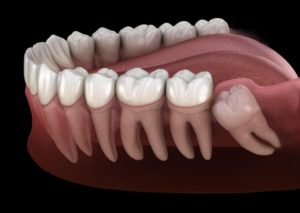
You are sitting in the dental chair thinking all is well with your smile. You take excellent care of your teeth because you want them to last an entire lifetime. Then, suddenly your dentist says your wisdom teeth are growing in and need to come out. To you, extraction seems extreme. Is removing them really necessary? While some patients can get their wisdom teeth without extraction, most people need to have them removed. In this post, you’ll learn about problems that wisdom teeth can cause if they are not extracted as recommended.
Infection
Wisdom teeth ideally would erupt just like other teeth, with the crown somewhat level. However, they often come in improperly at an angle. With this orientation, bacteria and plaque can easily get stuck in the gum tissue, leading to an infection, pain, swelling, and tenderness in that area of the mouth. Your dentist may want to remove your wisdom teeth to help you avoid an infection in the first place.
Cysts
Even if your wisdom teeth don’t cause an infection, it can still wreak havoc on your oral health. In some cases, the impacted teeth can remain trapped within the jawbone. There, cysts, which can be difficult to treat, can develop in the bone tissue and expand, damaging the jawbone further and endangering other teeth. Although rare, tumors can also develop as a result of impacted wisdom teeth. Fortunately, removing these teeth early can prevent these outcomes.
Damage to Second Molars
Above and below the gums, your third molars could be exerting excess force on your second molars. Although teeth are made of the strongest material in your body, they can still be damaged under great pressure. If wisdom teeth are not removed when they need to be, they can grind against the second molars and wear down the protective enamel, making these teeth more susceptible to cavities and fractures. They can also cause bone loss around the second molar, weakening your bite and increasing your risk of tooth loss later on.
Overcrowding
Just imagine finishing with braces and having a perfectly aligned smile. Then later on in your teenage years, wisdom teeth force their way in and push your teeth out of alignment. In some cases, third molars can fit within an arch but not without the other teeth becoming overcrowded. As a result, your smile may require additional orthodontic treatment down the road to correct the issue. Or, you could get your wisdom teeth removed when your dentist identifies them as a potential problem.
Although extraction can seem intense and maybe even overwhelming, it is sometimes necessary to preserve the rest of your smile. When you take a more proactive approach to your wisdom teeth, you can steer clear of a lot of trouble and keep your smile strong for many more years to come.
About the Author
With more than four decades of clinical experience, Dr. Jack Markusen is a respected expert in the dentistry field. In fact, he has taught many national and international training courses and has served in leadership positions in prestigious professional organizations, including South Carolina state president of the American Society of Dentistry for Children. He enjoys watching his patients grow and is proud to play a role in keeping their smiles safe and healthy. If you have wisdom teeth that may need to be extracted, you can set an appointment with Dr. Markusen through his website or by calling 843-916-0990.
